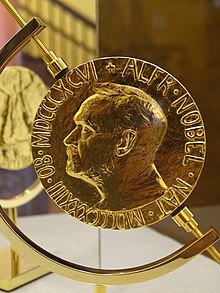
Back Nobelprys vir Vrede Afrikaans Friedensnobelpreis ALS جائزة نوبل للسلام Arabic جايزة نوبل فى السلام ARZ শান্তি ন'বেল বঁটা Assamese Premiu Nobel de la Paz AST नोबेल शांति पुरस्कार AWA "Nobel" sülh mükafatı Azerbaijani Friedensnobelpreis BAR Nuobelė taikuos premėjė BAT-SMG
| Nobel Peace Prize | |
|---|---|
 Jimmy Carter's 2002 Nobel Peace Prize | |
| Awarded for | Outstanding contributions to peace: arms reduction, international cooperation, and organisations contributing to peace, and human rights contributions to peace[1] |
| Location | Oslo, Norway |
| Presented by | Norwegian Nobel Committee on behalf of the estate of Alfred Nobel |
| Reward(s) | 11 million SEK (2024)[2][third-party source needed] 10 million SEK (2022)[3] |
| First awarded | 10 December 1901[4] |
| Currently held by | Nihon Hidankyo (2024)[5] |
| Most awards | International Committee of the Red Cross (3) |
| Website | nobelprize.org/peace |
"We who have fought against you, the Palestinians, we say to you today, in a loud and a clear voice; Enough of blood and tears. Enough!"
The Nobel Peace Prize (Swedish and Norwegian: Nobels fredspris) is one of the five Nobel Prizes established by the will of Swedish industrialist, inventor, and armaments (military weapons and equipment) manufacturer Alfred Nobel, along with the prizes in Chemistry, Physics, Physiology or Medicine, and Literature. Since March 1901,[9] it has been awarded annually (with some exceptions) to people who have "done the most or the best work for fraternity between nations, for the abolition or reduction of standing armies and for the holding and promotion of peace congresses."[10] The Oxford Dictionary of Contemporary History describes it as "the most prestigious prize in the world."[11]
In accordance with Nobel's will, the recipient is selected by the Norwegian Nobel Committee, a five-member committee appointed by the Parliament of Norway. The prize award ceremony is held in Oslo City Hall since 1990, previously in the assembly hall of the University of Oslo (1947–1989), Norwegian Nobel Institute (1905–1946), and the Parliament (1901–1904).
Due to its political nature, the Nobel Peace Prize has, for most of its history, been subject to numerous controversies.
The 2024 prize was awarded to Nihon Hidankyo from Japan, an organisation formed by survivor groups of atomic bomb victims "for its efforts to achieve a world free of nuclear weapons and for demonstrating through witness testimony that nuclear weapons must never be used again".[12][13]
- ^ "Behind the scenes of the Nobel Peace Prize". The Nobel Prize. 28 September 2021. Archived from the original on 15 December 2023. Retrieved 29 March 2024.
- ^ "The Nobel Prize amounts". The Nobel Prize. Archived from the original on 20 July 2018. Retrieved 2 January 2025.
- ^ Cite error: The named reference
Fortunewas invoked but never defined (see the help page). - ^ "The Nobel Peace Prize 1901". www.nobelprize.org. Archived from the original on 2 January 2007. Retrieved 29 October 2017.
- ^ "The Nobel Peace Prize 2024". The Nobel Prize. 11 October 2024. Retrieved 11 October 2024.
- ^ Rabin, Yitzhak (17 November 1996). The Rabin Memoirs, Expanded Edition with Recent Speeches, New Photographs, and an Afterword. University of California Press. p. 401. ISBN 978-0-520-20766-0.
Let me say to you, the Palestinians: We are destined to live together, on the same soil in the same land. We, the soldiers who have returned from battle stained with blood, we who have seen our relatives and friends killed before our eyes, we who have attended their funerals and cannot look into the eyes of parents and orphans, we who have come from a land where parents bury their children, we who have fought against you, the Palestinians – we say to you today in a loud and clear voice; Enough of blood and tears. Enough.
- ^ Dicus, Howard (1993). "1993 Year in Review: Israeli-Palestinian Peace Treaty". United Press International. Retrieved 16 September 2012.
- ^ "20 years on, Rabin's right-hand man regrets arguments won, and lost". The Times of Israel. Retrieved 28 November 2016.
- ^ "The Nobel Peace Prize 1901". Nobel Foundation. 1972. Archived from the original on 2 January 2007. Retrieved 19 March 2016.
- ^ "Nobel Peace Prize", The Oxford Dictionary of Twentieth Century World History
- ^ Palmowski, Jan (1 January 2008), "Nobel Peace Prize", A Dictionary of Contemporary World History, Oxford University Press, doi:10.1093/acref/9780199295678.001.0001, ISBN 978-0-19-929567-8, archived from the original on 29 March 2024, retrieved 6 April 2023
- ^ "The Nobel Peace Prize 2024". Nobelprize.org. Retrieved 11 October 2024.
- ^ Edwards, Christian (11 October 2024). "Nobel Peace Prize awarded to Japan's Nihon Hidankyo for efforts to rid world of nuclear weapons". CNN. Retrieved 11 October 2024.